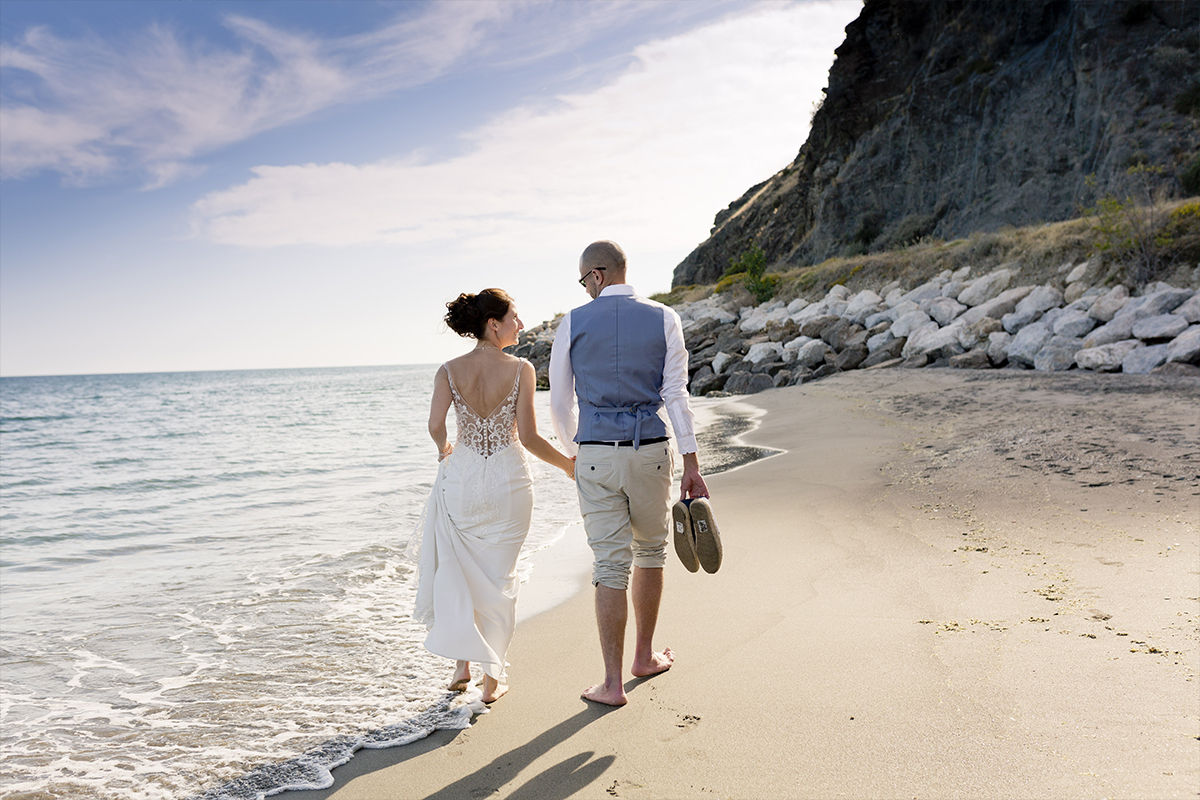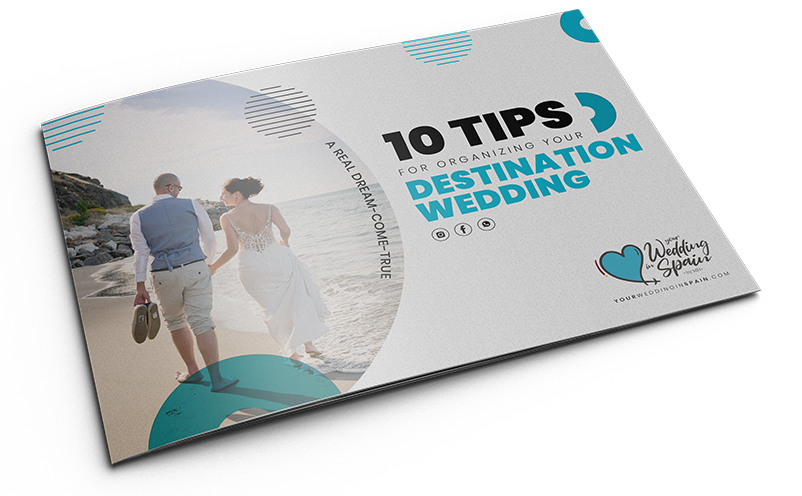Would you like to talk about your future wedding? Make an appointment and tells us all about it.
Menú
Menú
Keys to getting married in Spain
How do you get married in Spain? Everything you need to know about planning your wedding in Spain if you live outside the country
Your Wedding in Spain / Last update: 09/15/2020
Share on facebook
Share on twitter
Share on linkedin
Share on whatsapp
Share on tumblr
Share on telegram
Share on email
If you live outside of Spain and dream of planning your wedding here, pay close attention, because we will tell you everything you need to know for making your wedding a real dream-come-true.
Table of contents
What is a Destination Wedding?
Destination weddings are those weddings celebrated in a country different from the couple’s place of residence.
Destination weddings are a balanced combination of exotic, originality, and romance. Couples generally celebrate somewhere that has some significance and special meaning to them. This is the norm; however, increasingly more partners chose destination weddings for a variety of reasons.
Today’s globalization, social networks, telework, ease of travel, and a continuously changing world have made destination weddings possible. The concept of exotic destinations has shifted from the Bahamas, the Maldives, Seychelles, to Andalusia, Tuscany, Algarve, El Bierzo, which has created a rise in these weddings. It’s also thanks to the increasing number of relationships, each partner from a different place, who choose to celebrate in one of the said locations.
In reality, any wedding celebrated outside of either partner’s hometown is a destination wedding, even in the same country.
Some couples look for something original and different, and destination weddings allow them to break free from traditional wedding etiquette. These weddings are generally more intimate due to the effort guests make to attend this type of event.
Many couples use the opportunity to combine the wedding and honeymoon, which means less stress, not to mention, it is more cost-effective and convenient.
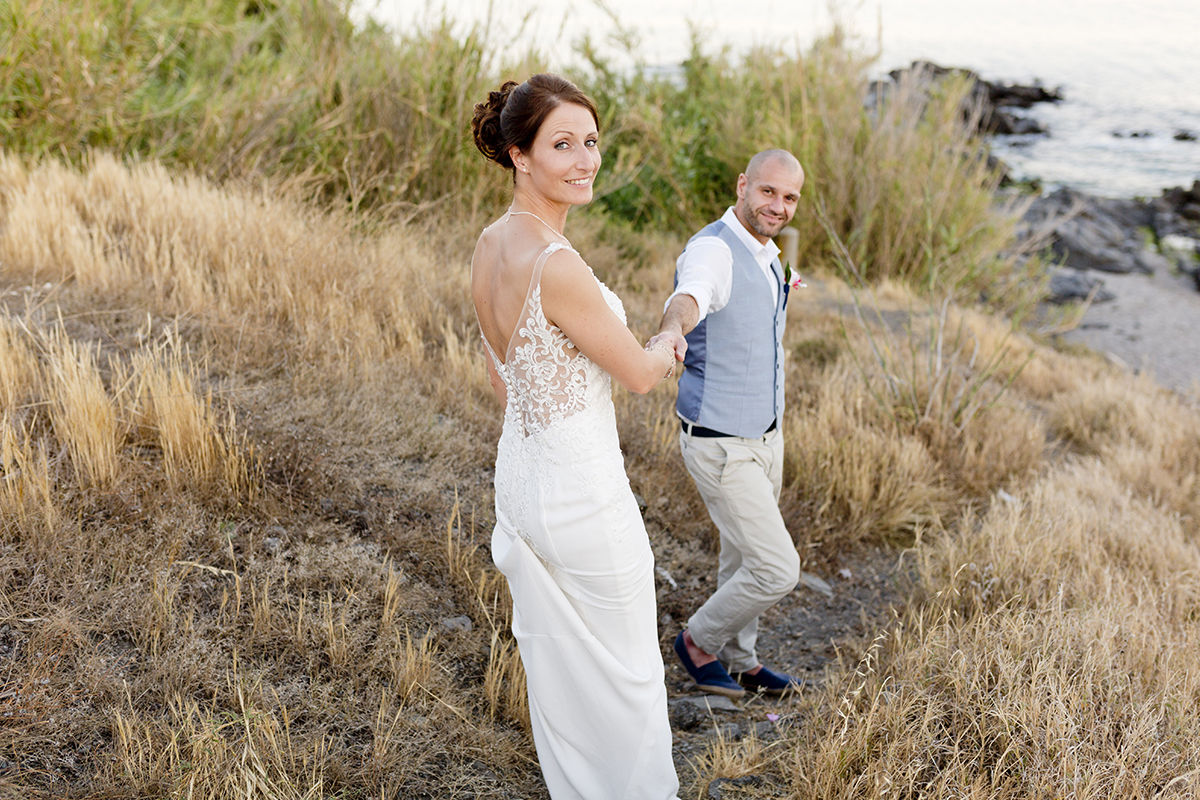
What are weddings like in Spain?
Traditions and characteristics of Spanish weddings
The majority of Spanish weddings are religious, although there are many civil ceremonies, plus symbolic weddings are becoming more popular. Unlike other countries, ceremonies and celebrations often start at the end of the day, lasting until the following day.
No matter the type, it is custom in Spain for the groom to wait for the bride at the altar, beside his mother, as the bride walks to the altar holding onto her father’s arm, who hands her to her future husband. Family is an integral part of Spanish ceremonies.
Other characteristic rituals at Spanish weddings are the thirteen wedding coins. Twelve silver or gold coins represent each month of the year, and one bronze coin symbolizes the couple’s charity. The groom hands them to the bride, and the bride gives them back to the groom as a mutual promise to share and care for their future assets and share in the household responsibilities. The priest blesses these coins in religious ceremonies.
The exchanging of rings is another significant moment at Spanish weddings. Custom dictates that the future spouses mutually exchange rings, placing them on their respective partner’s left ring finger.
Another tradition is tossing rice at the couple as they leave the church (or wherever the ceremony takes place). This tradition symbolizes good fortune, fertility, abundance, and prosperity.
At a typical wedding, guests generally wait for the newlyweds to arrive enjoying tapas and drinks, enlivened with show-cooking and live music. When the newlyweds arrive, everyone sits, and the feast begins. As a thank you for attending, the couple usually hands out a small gift to each guest at their seats.
During the meal, the newlyweds visit each table to mingle with the guests when they give their gifts to the couple.
Between each course, there is generally a spontaneous toast made by the guests in honor of the newlyweds. Unlike other cultures, there usually aren’t formal toasts given by close friends or relatives in Spain.
When the cake arrives, the newlyweds cut the cake, and then the open bar and party begin. After which, numerous combinations the following festivities begin:
- Varied stations, dessert table, mojito bar
- Midnight snack
- Churro stand
- Fireworks
- Band
- DJ
These popular services and events are subject to the law or venue policy and closing times.

What do brides wear in Spain?
Weddings in Spain are full of tradition and, of course, superstition. The bridal gown is one of the main features, which is why we are going to talk about a bit of history, some mysteries, and what lies behind these peculiar traditions.
Why does the bride wear white?
The white dress is a more recent trend at Spanish weddings. Historically, brides wore black in Spain. If today’s brides found their great grandmother’s wedding photos, they’d be surprised by the dark dresses worn on their wedding day, accompanied by a veil or a mantilla, and a headdress with a white flower.
The white wedding dress became popular in Europe after Queen Victoria’s wedding in 1840. At first, white was only for the wealthiest; however, the white wedding dress eventually permeated every corner of the continent and all social classes.
Why do brides often wear a veil?
Veils have acquired different meanings over time. Depending on the period or religion, veils have symbolized protection, giving away, obedience or submission, and purity or virginity, at weddings. However, today it’s generally just another accessory to complement the bride’s look.
There are different types of veils, each with a particular function. A long one can enhance your figure, while a short one can complement the bodice. Here are the 9 types of veils used in Spain:
- Blusher. It is the shortest veil and is only used to cover the bride’s face as she walks to the altar. (50-60 cm)
- Birdcage. This short veil, made of lace or net, covers the bride’s face and is fastened on one side.
- Elbow.
- Fountain.
- The fingertip measures 120-150 cm, and is, without a doubt, the most popular veil and most stylized.
- The Waltz falls at the knees and is perfect if you don’t want it to touch the ground but do want it to lay over the dress.
- Chapel. It is slightly longer than the dress.
- Cathedral. It is 2.5 meters long and used with a long train.
- Royal. It is 3 meters long, although some measure twice that.
Superstitions
Undoubtedly, every Spanish bride has carried four lucky charms, since we can remember, with her on her wedding day:
- “Something new” symbolizes hope and optimism for the life journey she is about to embark on.
- “Something borrowed” from someone happily married. The borrowed item brings good fortune.
- “Something blue” symbolizes love, purity, and fidelity.
- “Something old” means continuity with the past and with family.
Spanish brides do not wear pearls.
Another age-old superstition at Spanish weddings is the belief that pearls bring bad luck on the wedding day. Pearls symbolize tears, and using them on the wedding day would only bring sadness and misfortune to the future matrimony.
Wear a garter.
The bride wearing a garter on her right leg is a deep-rooted tradition.
According to belief, receiving a piece of it from the bride brings good luck to the guests, and so it is custom for guests to chase the bride and take off the garter, ripping off a piece to keep.
However, this custom has changed over the years. Brides began throwing the garter to guests, which later evolved into today’s tradition. The groom now removes the garter and hands pieces to the guests.
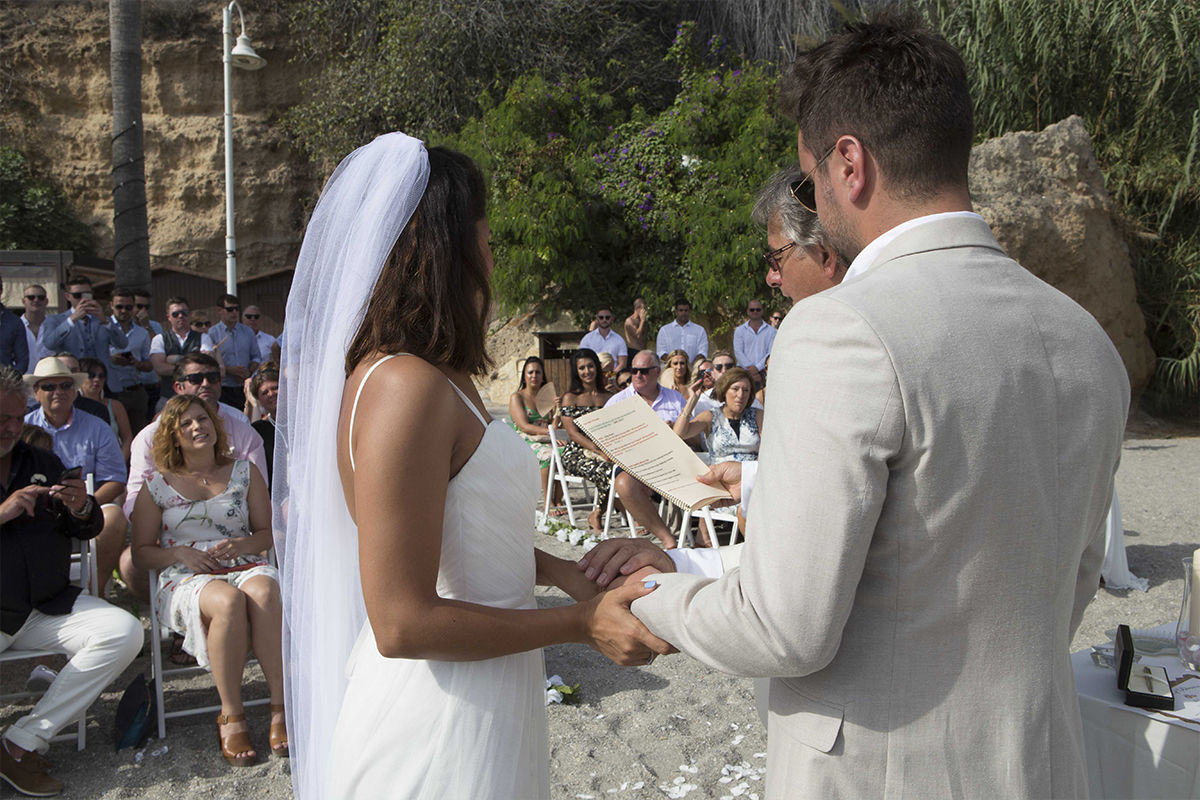
10 Spanish designers that will help you find the perfect bridal look
Pronovias.
Pronovias group carries a wide range of wedding dresses (Pronovias, Atelier Pronovias, St Patrick, La Sposa, and White One), party dresses (Fiestas Pronovias, It’s My Party), and accessories (Les Accessoires). It’s a world leader in wedding dress manufacture and design. With 4,000 stores in 105 countries, Pronovias is synonymous with know-how and quality.
If you are looking for a dress that meets your expectations, this is definitely the brand for you. You won’t regret falling in love with the beauty their designs offer.
Rosaclará.
From designers like Christian Lacroix, Karl Lagerfeld y Zuhair Murad, Rosa Clará kicks off each Valmont Barcelona Bridal Fashion Week, the premier international bridal fashion show. She surprises us with creative and enchanting dresses, full of the latest trends and fashions sure to make any bride’s dreams come true. The eagerly awaited annual fashion show has made this company a sector leader for both the professional audience and women worldwide. It is one of the longest-lived and most well-established companies in the wedding industry.
Dánae Tobajas.
This atelier looks for the most exclusive designs and wins the hearts of all brides who confide in them. They provide custom-made dream-dresses based on the bride’s preferences and the most flattering style for her figure.
Helena Mareque.
This Madrid-based designer knows her materials well, creating sophisticated designs and one-of-a-kind pieces.
María Barragán.
Complicity, effort, and exclusivity best define María Barragán’s work. This master craftswoman has two decades of professional experience under her belt. Her collections offer quality, elegance, creativity, and, most importantly, fulfill “the dream.”
Isabel Núñez.
Isabel Núñez’s style is young and fresh, combined with tradition. She enjoys dressing feminine and elegant women, but beauty is what most inspires her. At a mere 26 years of age, Isabel Núñez has become a national household name in haute couture.
Paula del Vals.
Paula del Vals is another prominent designer in Spanish wedding fashion. She has more than 15 years of experience creating custom-fit gowns for women at her dressmaking shop in Murcia. Her signature style is discreet, with attention to care and stunning details.
Cristina Pascual.
From day one, Cristina Pascual decided to innovate wedding, pursuing: exclusivity and quality. Here, they custom design each dress and headpiece at their shop with the sector’s top professionals’ help while using the finest fabrics and materials. Together, they hand-make each piece with a shared philosophy and artisan process, providing their customers with exceptional products.
Raquel Ferreiro.
This Madrid-based Galician Architect is an expert wedding fashion and pattern designer. She is sure to help you find that breathtaking dress you only imagined in your wildest dreams.
Belén Barbero.
Dresses that escape convention and exude emotion. Unique artisan embroideries and enchanting fabrics are hallmarks of this designer.
Steps and requirements to celebrate a legal wedding in Spain
Unfortunately, getting married is not a simple as saying «I do,» especially if you are from another country. You will have to go through some formalities before reaching that fantastic moment. Not to worry, we will tell you everything you need to know about planning a religious, civil, or symbolic ceremony.

Who can legally marry in Spain?
Couples that fulfill the following parameters can legally marry in Spain:
- Two Spanish citizens.
- One Spanish citizen and one foreigner.
- Two foreigners, as long as one is a Spanish resident.
- A marriage between two foreigners celebrated by the church.
Therefore, a civil marriage between two non-resident aliens in Spain is not legal.
Also, the following persons cannot legally marry in Spain:
- Minors not emancipated (16 years-old)
- Anyone currently legally married.
- Relatives up to the third degree.
Who can officiate a marriage in Spain?
Articles 49 and 50 of the Civil Code establish the following officiates:
- The judge responsible for the Civil Registry.
- The mayor of the municipality where the wedding is held, or
- the councilor delegated by the mayor for this function.
Furthermore, the following may perform marriages:
- Diplomatic officials in charge of the Civil Registry abroad.
- The captain or commander of ships and aircrafts, if the marriage is celebrated on said vessels.
Where can a wedding be held in Spain? Can it be private, or does it have to be public?
A common question is whether it is possible to hold a legally binding wedding at a private location. In other words, somewhere other than a courthouse, the Civil Registry or Municipality, etc. When a couple decides to celebrate their non-religious wedding at an estate, a hotel, a farmhouse, or other private property:
The answer is yes. For the most part, you only have to pay the corresponding fees to the location’s corresponding Judge or Notary or request the officiate’s relocation from the corresponding Registry or Town Office. You must also pay the tax or established public price. It depends on the officiate’s availability.
Possible types of weddings in Spain
Civil weddings
Necessary Documents
- Photocopy of ID / Passport / Residency Card
- Census certificate
- Official birth certificate
- Declaration of marital status
- In the event of being widowed or divorced: the marginal inscription of divorce or the previous spouse’s death certificate.
Procedures
First of all, both parties must request a single status certificate and a declaration of nationality at the consulate of their respective countries.
Accompanied by a witness, you must present these documents to the corresponding Civil Registry. Records processing at the Civil Registry takes between 30 and 50 days. Once you receive the Civil Registry’s authorization, you can request an appointment with the local Courthouse or Town Office, where the wedding will be held.
The ceremony can be held either at the Civil Registry, the Town Office, or the District Municipal Boards.
Wherever you decide to hold the wedding, you must contact the Mayor or the Delegated Councilperson of your choice to request a wedding date.
Price
The average price for ceremonies at a Town Office is between 150 and 300 euros. This is the public price or public tax for renting the hall. It is free if held at the Courthouse.
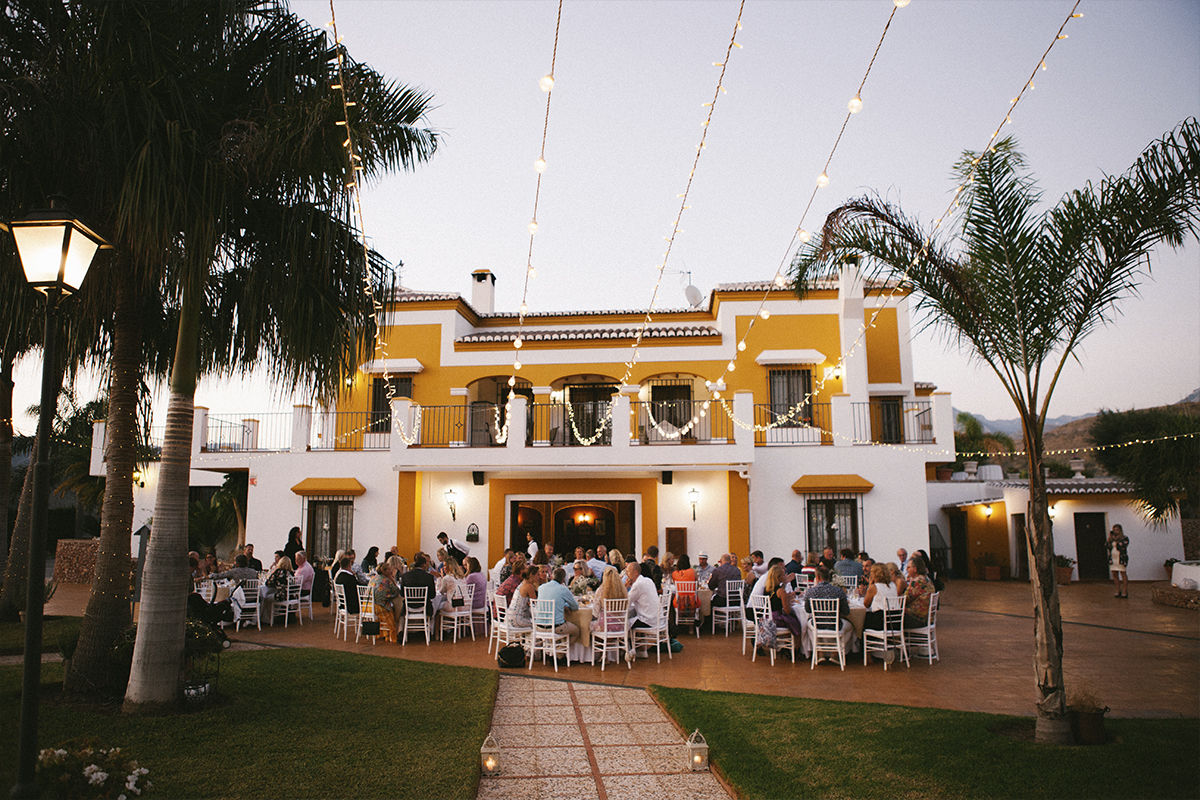
Religious weddings
The first item you must plan for this type of wedding is the date. Once you set your date, you go to the church. Since this is a destination wedding, there will likely be many changes. There are often conflicting schedules when trying to accommodate the available date, priest, and church. Once you achieve this, the rest is simple!
The following step is to request marriage records. These records are available at the parish church, where at least one person is a registered resident. However, suppose the wedding is held at a church where neither party resides. In that case, a records transfer must be requested, like at any destination wedding.
What documents are included in the marriage records? The following documents are included:
- Baptismal certificate
- Birth certificate
- Historical census certificate
- Family record book
- Pre-marriage course certificate
- ID card photocopy
Witnesses, marriage annulments, widow certificate, or divorce decrees must be presented where applicable.
Price
There are different registries the couple must pay.
First, you must pay for the issuance of documents. For example, a baptismal certificate costs around 10 euros, and marriage records cost between 50 and 100 euros, depending on whether a transfer exists.
Additionally, the couple will have to pay for the wedding services and the church, ranging between 250 – 600 euros, depending on the parish or church.
How much a destination wedding in Spain costs?
Regardless of where you want to get married, there is a common denominator to all weddings wherever they take place, and that is the dreaded: BUDGET. Here we are going to explain to you in a very easy and clear way what the expenses that you will have to face are and we will give you an idea of how much the most important services of a wedding usually cost.
How important is the budget for a wedding?
Without a doubt, the budget of a wedding is as different as each of the couples who get married. Making a standard budget is very hard because there will be many factors that determine the final price.
The factors that will influence your budget will be the number of guests, the city where you want to get married, the venue, the time of the year or the type of decoration you want in your wedding.
Without a doubt, our wedding day is one of the most important moments in our lives. We will always keep it in our memories and we will live that moment with illusion and emotion. On many occasions, this illusion causes the budget to get out of control, since we want that day to be unforgettable. That’s why it is important to have a budget which fits our economic possibilities and which serves as a guide for our wedding not to become a financial disaster.
Below, we are going to break down the different items that make up the budget for a wedding and we are going to guide you on how much each one could cost, always taking a wedding of 100 guests as a reference.
Average budget?
Probably, the first thing you’ve asked yourself once you’ve decided to get married in Spain, or maybe even before making the decision, is how much the wedding is going to cost. As we have indicated before, establishing a standard budget is really hard, because each and every wedding ends up being made to measure and each couple hires different services, chooses different types of flowers, etc.
Currently, the average price of a 100-guest wedding is of 20,000 euros, maintaining that price or not will depend on the extras you want to incorporate.
A very important factor which will determine the total cost will be the place you have chosen to celebrate this day. In the table below, we are going to show you the average cost of celebrating a wedding depending on the region of Spain.
Estate | Average price | Andalucía | 16.700 € |
|---|---|
Aragón | 22.800 € |
Asturias | 24.400 € |
Islas Baleares | 17.300 € |
Islas Canarias | 12.400 € |
Cantabria | 19.600 € |
Castilla La Mancha | 36.500 € |
Castilla y León | 20.500 € |
Cataluña | 17.900 € |
Extremadura | 19.900 € |
Galicia | 20.900 € |
La Rioja | 26.200 € |
Comunidad de Madrid | 22.800 € |
Región de Murcia | 23.800 € |
Navarra | 27.600 € |
País Vasco | 22.300 € |
Comunidad Valenciana | 20.200 € |
What should I take into account when preparing my wedding budget?
In this section, we are going to explain to you what items you have to take into account and we are going to give you an approximate price for each service so that you can prepare your own budget with no trouble.
We remind you that these prices are estimated for a 100-guest wedding.
Ceremony
Church / Celebrant / Town Hall. There are many different ways to celebrate the wedding, it will depend on the couple. If you have decided to have a traditional wedding and get married in a church, the ceremony can cost from 100 to 600 euros.
If you are planning to celebrate the ceremony at the same villa or venue that you have rented, and have it officiated by a professional celebrant, the price will range from 380 to 650 euros.
You have the option of getting married at a Town Hall (as long as one of the spouses is registered in the municipality or resides in Spain) which has a cost of 150 to 200 euros.
Ceremony Decoration. This section of the budget will depend on the style of the decoration, quantity of flowers, the kind of flower and the season of the year. It will range from 300 to 1500 euros. Keep in mind that sometimes, this decoration can be reused to decorate different areas of the venue as well.
Flowers (for the couple and others). No two brides are the same, which is why these floral elements are as diverse as their price. Buttonholes, bouquets and bridal bouquets can cost from 300 to 500 euros.
Ceremony / Cocktail Music. If you wish to have live music during the ceremony (a soprano, a violinist, a pianist, etc.) this will cost approximately from 300 to 600 euros.
Transport
Bridal car/horse carriage. If you want the bride to arrive at the venue and, after the wedding, the bride and groom to travel in a brand new vehicle with a driver or in a horse carriage, you can find this service for 350-850 euros.
Buses. If we want our guests to be able to come to our wedding without having to worry about bringing their own vehicle (so that they are able to enjoy the party) or having to pay for a taxi, the easiest thing to do is to hire a bus that picks up the guests at a point close to them and takes them to the place of the celebration. Obviously, the cost will depend on the number of guests and the distance travelled, and will range from 350 to 800 euros.
Photo & Vídeo
Photographer. Hiring a wedding photographer is one of the most complicated decisions, not only because of the different services they can provide, but also because of the very different prices they can offer you. We can find photographers from 1200 to 2800 euros.
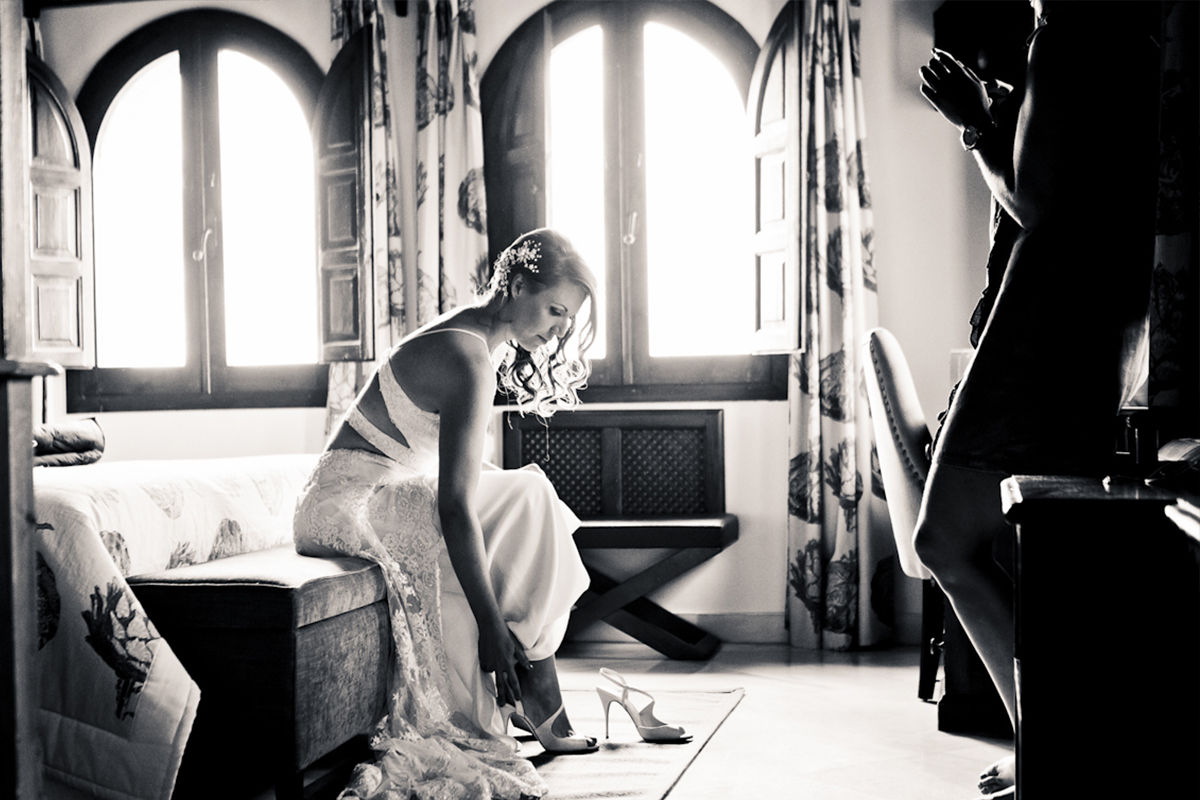
Videographer. The video report, the editing and the delivery of the video can cost from 1200 to 1800 euros.
Drone. This is a very popular service nowadays, you can record the most special moments of your wedding from the most spectacular perspectives for a price of about 300-600 euros.
Accommodation
Accommodation for the Bride and Groom. On many occasions the venue or villa rented for the celebration has an accommodation service, so the bride and groom and their closest relatives do not have to think about extra costs.
If this is not the case, and you have to stay on your wedding night at another place, the price will be of about 150-400 euros.
Accommodation for Guests. Sometimes the bride and groom are the ones who take care of accommodating their closest guests and the ones who pay for it. You can find rooms near the venue for prices ranging from 65 to 120 euros.
Honeymoon. As we have mentioned before, many venues have accommodation services, so the bride and groom can enjoy a few days’ stay at no extra cost. And since they have already travelled from their country of origin to get married in Spain, their honeymoon does not usually involve any other expenses.
If, on the other hand, you have decided to continue travelling after your wedding, the price will depend on whether you travel through Spain or decide to go to another country, here the price can range from 3,000 to 6,000 euros.
Dresses
Bridal Dresses. Here the cost will depend on the cut of the dress, the brand, or if it is custom-made … prices are very different, you can spend from 500 euros to 20,000 euros, but the normal price ranges from 1500 to 3000 euros.
Bridal Accessories. Shoes, bag, veil, lingerie… Here you can spend what you want, but we could say that the budget for this is from 400 to 800 euros.
Groom Suits. The wedding dress usually costs from 400 to 1800 euros and depends on the style, cut and fabric.
Groom Accessories. Shoes, suspenders, tie, bow tie or cufflinks are some of the accessories you will need, this will cost from 250 to 400 euros.
Rings. It will depend on the type of metal or precious stone you choose, the design and obviously the carats, but the most standard prices will range from 150 to 600 euros.
Hair and Make Up
Trying on the Hairstyle. Normally it is necessary for brides to try the hairstyle before the wedding, this can cost from 40 to 100 euros.
Hairdressing. Once you have chosen the best hairstyle for your big day, now it is time to reproduce it, the price is usually of about 75-120 euros.
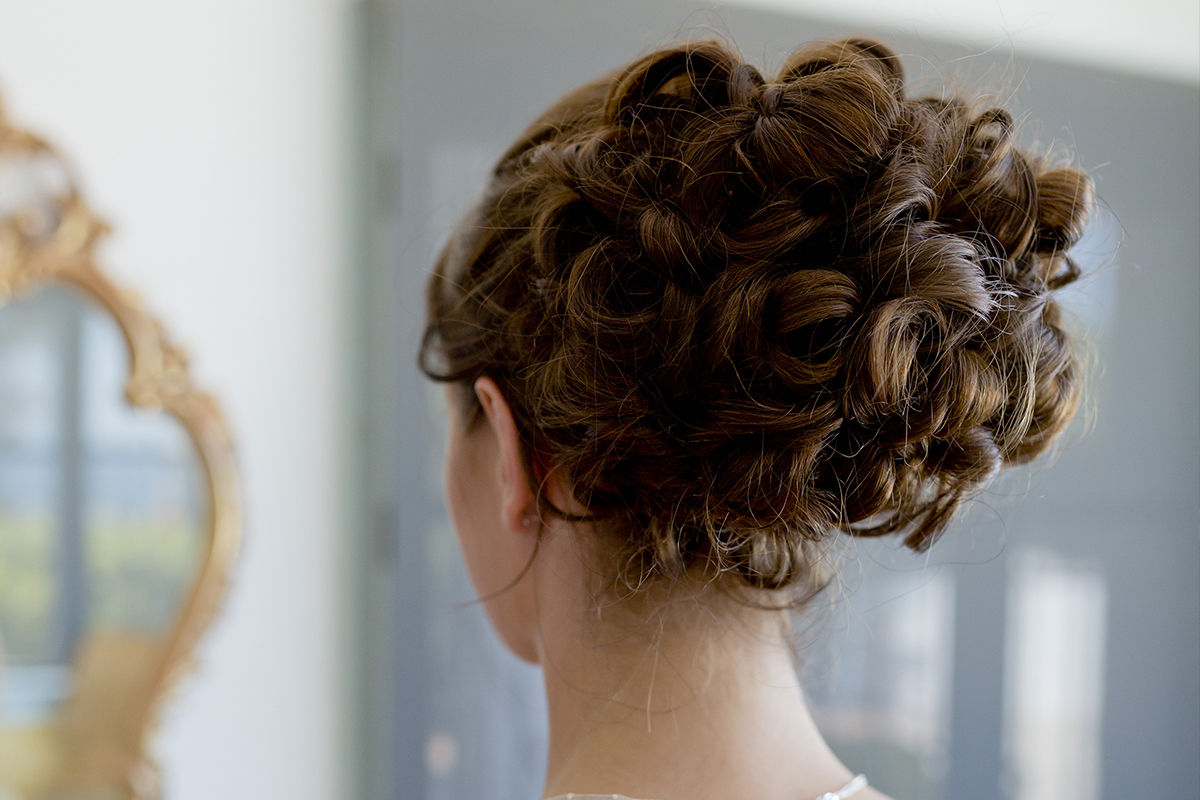
Hairdressing for Mothers and Bridesmaids. Generally, the professional and her team, if necessary, will take care of the bride, mothers and bridesmaids, either at their establishment or at wherever the bride, mother and bridesmaids are, this service has a price that ranges from 35 to 80 euros.
Trying on the makeup. As it happens with the hairstyle, it is necessary to try the makeup on before the wedding, this has a cost of about 40-90 euros.
Makeup. The service of a makeup artist during the day of the wedding has an estimated price of 75 to 120 euros.
Makeup for Mothers and Bridesmaids. The makeup for mothers and bridesmaids usually goes from 40 to 90 euros.
Banquet
Venue rental. If you have decided to get married at a villa, venue, castle, country house, farmhouse … these establishments charge a rental fee for saving the space, prices range from 1,800 to 5,500 euros.
Catering. Without a doubt this is a determining factor, since depending on the number of guests and the menu you want to offer them, the percentage of your budget that you will have to invest in this item will be greater or smaller. Currently you can find wedding menus ranging from 65 euros to 150 euros.
Wedding Cake. There are many caterers and even some venues that offer a testimonial cake so that the bride and groom can fulfill the tradition of the cut, and once the cake has been cut, they serve the dessert chosen by the bride and groom.
But if you are one of those sweet-toothed couples who want to give your guests a nice wedding cake, the price goes from 150 to 350 euros.
Table decoration. Catering or venues can also include a basic table decoration in the price of the menu or rental. If this is not the case or if you want to complement the one you have included, you can decorate a table for approximately 10 euros each.
Decoration of the venue. This is one of the aspects in which the bride and groom have more uncertainty. Generally, the venue is a beautiful place with its own decoration and depending on the time of the year if it has its own gardens which may have bloomed, they will hardly need any additional decoration. However, many couples decide to add extra decoration such as candles, candleholders, flower arches, lighted letters, etc… This part of the budget can go from 500 to 3000 euros.
Live Music. Usually the cocktail and even the meal is livened up with some show or live music, this will have a different cost depending on the type of show, band or musician you choose. It will range from 400 to 800 euros.
Gifts for guests. It is common to give a little gift to your guests so that they have a souvenir of your wedding, this gift will cost from 4 to 7 euros per guest.
Party
Open bar. The price of the open bar will depend on the number of hours you want the party to last, it will cost approximately from 4 to 8 euros per guest per hour. Here it is very important for you to know that the price of the open bar will always be estimated based on the number of guests at the banquet, without counting minors.
Live music and DJ. Sometimes you hire a band, sometimes you decide to get a DJ and many couples prefer to have both. This entails a cost of around 600-1,800 euros.
Extras
Photocall. If you have thought of getting a photocall so that your guests can take home a good souvenir, depending on whether you decide to assemble a canvas and a frame, to decorate a corner with vintage furniture, a classic vehicle or even a photo booth, this can cost around 350-1500 euros.
Ham cutter, expert wine pourer… These are services that are always a success no matter how common they are, sometimes it is not necessary to be so original. The prices usually go from 350 to 500 euros.
Candy Bar. depending on the number of guests and the selection of sweets you want, the price will be range from 2 to 6 euros per person.
Mojito´s Corner. There are many couples who decide, during the open bar or at the cocktail party, to add it as a complement to the classic drinks. This will cost you about 300-650 euros.
Tent Rental. There are some people who do not have an outdoor space available for their guests to sit and eat or drink sheltered from the sun, or the breeze at nightfall. Sometimes the opposite happens, they do not have an indoor place in which to protect themselves from the wind or rain if the weather changes, so the option of installing tents in these spaces is always there. This service can have a cost of about 1200-3000 euros.
Shows (magic, horses, flamenco). Couples always want to surprise their guests by offering a live show at different times of the wedding. There are many and very varied prices, from 375 to 600 euros.
Churros, Ice Cream, Cheese… stands. Just like in the previous section, it is very common to hire some type of extra complement with different meals that are typical of the culture or area where you are getting married, so that the guests can serve themselves. You can find this for 5-8 euros per person.
Childcare. The price of this service ranges from 15 to 20 euros / h, you have to bear in mind that depending on the ages and the number of children attending the wedding you will have to hire more than one person.
Pre-wedding. If you want to organize a dinner the day before or to carry out some gastronomic or cultural activity while the wedding day arrives so that your guests can enjoy the experience of a destination wedding, this will have a price that will range from 12 to 15 euros per person.
Post-wedding. If you still want more after the wedding day and you wish to enjoy one more day with your guests, there is always the option of organizing a barbecue, a pool party or booking Balinese beds at a beach club. These activities will have a price of around 15-25 euros per person.
Wedding Planner. Organizing a wedding can be very stressful, especially if you do not live in the place where it is going to be held, therefore hiring this service is of special relevance.
Wedding planners will help you make the best decisions. Having a person who will relieve you from tensions, shorten waiting times between providers and adjust your budget will save you not only annoyances but also time and money. The fees of these professionals range from 1,500 to 3,500.
These are the different expenses that take place at weddings and their approximate price. With this information, you will now be able to make your own budget and face the challenge of sticking to it. We always recommend that you hire the help of a professional, not only to prepare your budget and work with it, but also to advise you on what to invest in and what not to, so that you spend your money in a sensible way. Good financial planning will help you have a stress-free wedding and will allow you to live both the preparations and your big day with all the excitement and emotion that you deserve.
COVID-19: How to plan your wedding in light of current events
Were you planning on getting married in 2020? Are you unsure about getting married next year? COVID-19 has changed many plans in 2020. We have learned to live with uncertainty and become more flexible. We are uncertain about how the situation will evolve or how to adapt and coexist with the virus.
When it comes to destination weddings, these times are unpredictable due to the differences in the pandemic’s development around the globe. Each country has its rhythm and varying measures regarding free transit through its borders and inside the territory.
Due to the current situation, approximately 70% of the more than 150,000 weddings planned for 2020 were postponed and 10% canceled.
The following questions have overwhelmed our email and WhatsApp these past months: We will be able to get married? Do I have to wear a mask at the wedding? Many couples are worried about how their wedding will turn out under current circumstances and seek expert information in the sector to help with decision making.
It would be laughable not to admit that we, the professionals, had many doubts when the pandemic began. However, we didn‘t rest on our laurels. Like we said, we have learned to live with uncertainty and become flexible in finding solutions.
Here we explain how to face wedding planning during the pandemic by going over the different safety measures.
Once the state of alarm was over, every region in Spain established and published security and hygiene measures to be taken in different situations. The use of masks, social distancing of at least 2 meters, and installing disinfectant gel dispensers for guests are standard guidelines throughout Spain that affect weddings. Apart from these guidelines, some regions allow for 100% capacity at restaurants and in open spaces, while others have a reduced maximum capacity of 75% to as little as 50% for indoor events.
How many guests can attend the wedding?
It all depends on the region and city. As mentioned earlier, each regional and local government has established its particular limits for maximum authorized capacities, depending on the virus’s virulence.
The maximum authorized capacity is also condition by whether your venue is outdoors or indoors.
These capacity rules affect both the ceremony (church, town hall, courthouse, etc.) and the reception (banquet hall, hotel, indoor or outdoor venue).
Are masks mandatory?
It is mandatory to wear a mask at all times, whether on the street, indoors or outdoors, even when maintaining the stipulated 2 meters.
It is not mandatory for children under 6, people with respiratory difficulties (with a doctor’s certificate), or during activities which are incompatible with wearing a mask, such as eating or drinking.
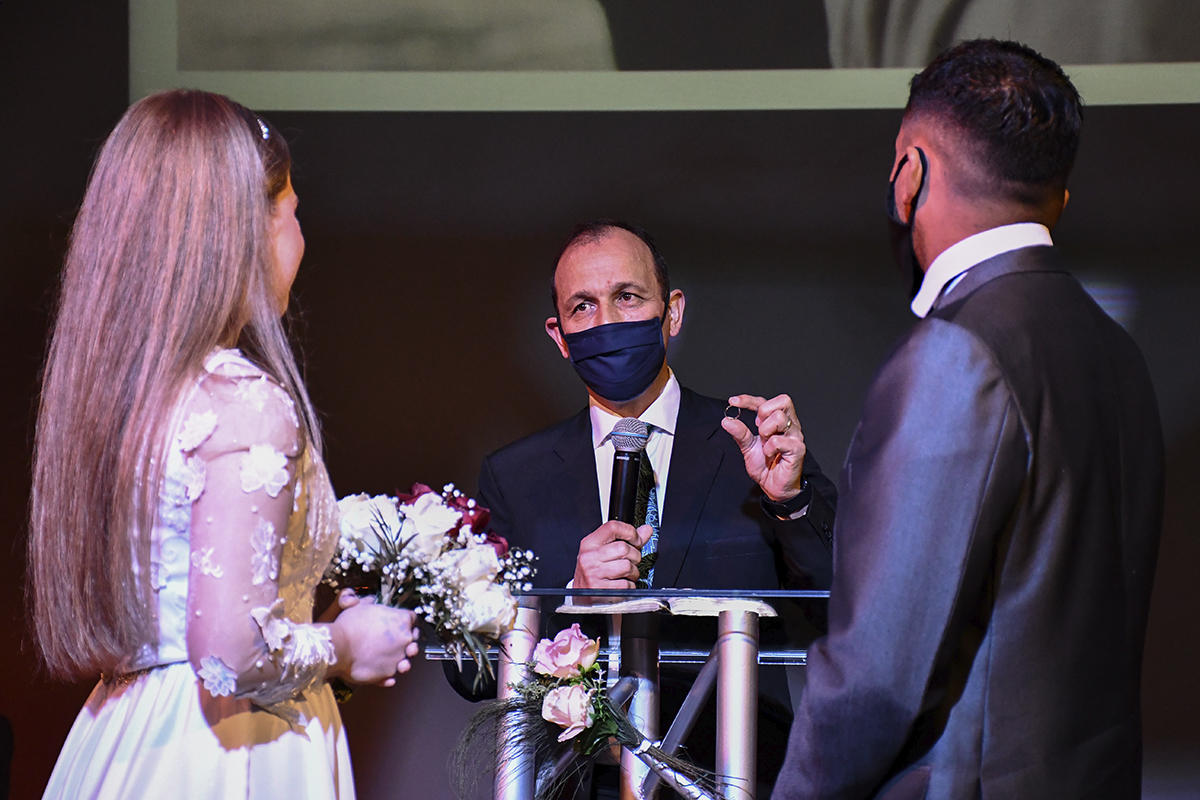
What security measures should we consider at the reception?
There should be disinfectant gel dispensers installed (at least at the entrance and outside of the restrooms). All spaces must be disinfected, and the venue must guarantee that guests maintain a safe distance, specifically with regards to table placement and assembly.
It is also mandatory for the establishment to comply with the following:
- Clean and disinfect the fixtures and furnishings, in particular, tables and chairs, and any other contact surface between one customer and another.
- Clean and disinfect the premises at least once a day.
- Prioritize the use of single-use linens. When not possible, the venue must avoid using the same linens or tablecloths between different customers.
- Venues must avoid using traditional menus, replacing them with electronic devices, chalkboards, signs, or other similar mediums.
- Keep service items, such as tableware, glassware, flatware, or linens, etc., in closed containers. If this is not possible, they must be kept away from customer and employee transit areas.
- Remove self-service items, such as napkin dispensers, toothpick dispensers, oil and vinegar sets, and other similar utensils, prioritizing single-use disposables.
- Establish a traffic flow at the venue to avoid crowding in high transit areas and prevent contact between customers.
- The maximum capacity in customer restrooms is one person. In the event assistance is required, the presence of one companion is permitted.
The server must maintain a safe distance from customers and wear a mask.
These measures might allow for the wedding to be celebrated, but what is happening in reality?
Vendors and suppliers are most interested in strict compliance with these regulations. Almost all companies have one person in charge of COVID compliance. Some have additional protocols, such as taking guests temperatures or giving a contact number in case of symptoms prior to the event. Spaces are organized to avoid crowding, and there are more drink bars.
Cocktails and the dance floor are the most controversial elements, creating the most doubt. Guests are closest to each other here and have more contact. Maintaining social distancing here might cause tension or discomfort for them. In reality, they are solving the matter by creating large, risk-free chill-out and lounge areas. These areas provide comfortable seating and tables, where guests can enjoy appetizers and music, with enough space to dance while maintaining a safe distance.
What advice can we give couples wondering whether or not they should celebrate their wedding?
If you proceed with your nuptials, we highly recommend taking out wedding insurance, carefully choosing suppliers and vendors, and signing a contract with them. It is critical to specify the agreed services provided and contemplate the current situation with any agreement. It is the only way to avoid issues with date modifications or cancellations.
Ultimately, expert advice is now a priority.
